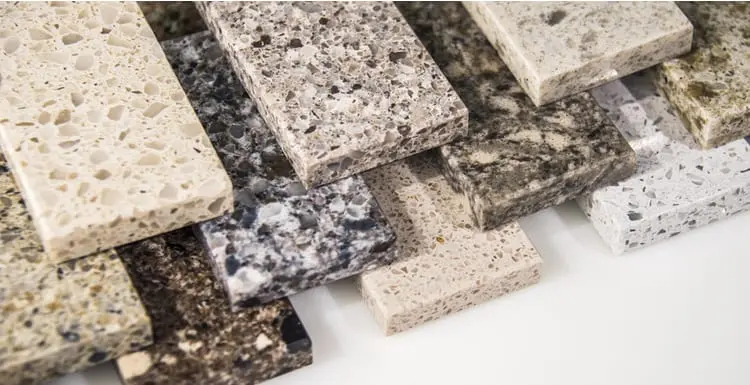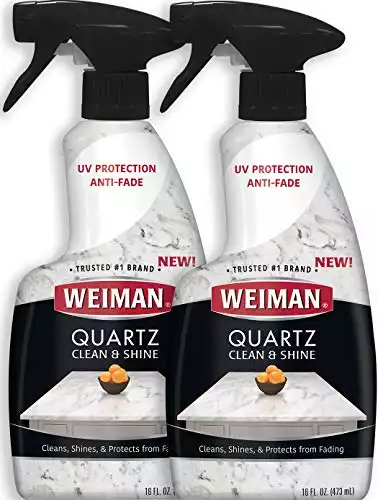Quartz countertops can be unforgiving if you don’t know how to properly clean them, as certain cleaners will damage them beyond repair.
Read on to learn how to clean quartz countertops and keep them in perfect condition.
What Are Quartz Countertops?

Quartz countertops are a popular alternative to natural marble and stone slab countertops.
Unlike natural solid slabs, nonporous quartz countertops are made of a mixture of ground quartz (90%), resin, polymers (8-10%), and pigments to form an engineered slab.
Quartz countertops are affordable, sturdy, durable, and can have a similar appearance to marble or granite countertops without being as difficult to maintain.
Quartz countertops are known for their stain resistance and antimicrobial properties. The coarseness of the ground quartz affects the overall appearance, but to the untrained eye, it looks like granite.
The End Result
Coarser grounds produce a flecked appearance, while fine grounds have a smoother look. Italy was the first country to begin producing quartz countertops.
Today, many American and European manufacturers make quartz countertops in a variety of colors, styles, and price points. They are available in colors like white, black, bronze, and cream.
You can find quartz countertops to suit almost any kitchen or bathroom. However, with the rise of this material, it’s more important than ever to know how to clean it.
In this guide, we’ll cover:
- What are quartz countertops?
- How to clean quartz countertops
- How to disinfect and remove stains from quartz countertops
- The best cleaners for quartz countertops
- What damages quartz countertops?
We spent a great deal of time putting together the best resource on the web, so be sure to read until the end. I’m sure you’ll learn something you didn’t know before!
How to Clean Quartz Countertops
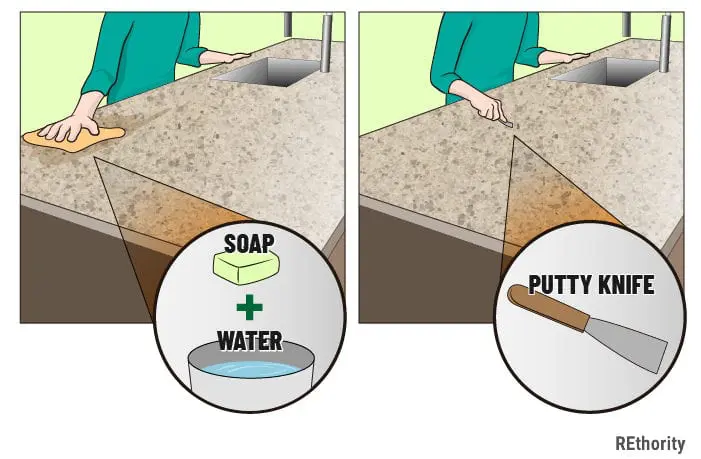
If you’re considering getting quartz countertops or just want to be sure you’re properly cleaning yours, there are a few important things you should know.
First, quartz countertops can be cleaned using mild dish soap and warm water. Just squeeze a drop or two of dish soap into warm water and use a soft cloth or sponge to clean the counters.
Do this regularly to keep the countertops clean. If you have caked-on or dried-on food or dirt on your quartz countertops, you’ll need to gently scrape it off.
Experts recommend using a putty knife for this. Hold the edge of the putty knife level with the countertop as you push it along to remove the caked-on residue.
Keeping it level with the countertop will prevent it from scratching the surface. Don’t use a scouring pad, or you’ll scratch the countertops.
Second, if you have grease or oily residue on your quartz countertops, use a degreaser to remove it. Do not use a degreaser that contains bleach, which damages quartz countertops.
You can do a small, inconspicuous spot test if you’re unsure if the degreaser will affect the color or finish. Once you’ve sprayed the degreaser onto the countertops, quickly wipe it away with a damp towel or sponge to remove the residue.
There are degreasers and cleaners designed especially for quartz countertops as well. We’ll cover those in the Quartz Countertop Cleaner and Polish section below.
How to Disinfect Quartz Countertops
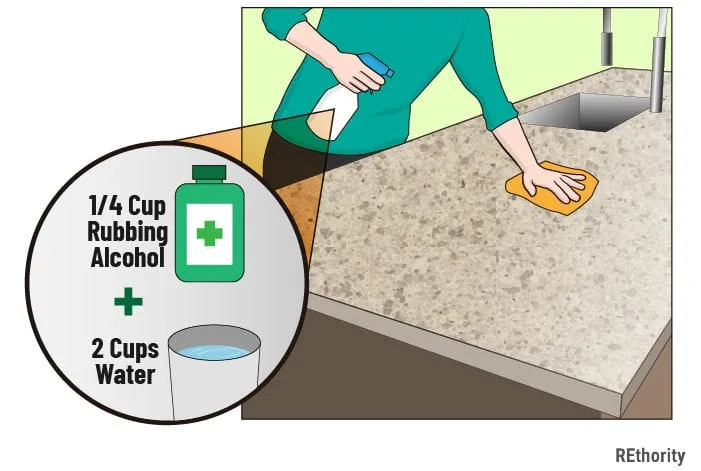
Quartz countertops are naturally antimicrobial, but they can be disinfected for added protection. Do not use bleach or vinegar to disinfect quartz countertops.
Instead, use a simple rubbing alcohol solution. Mix 1/4 cup rubbing alcohol with 2 cups of water in a clean spray bottle.
If you’d like a fresh scent, you can add a drop or two of your favorite essential oil to the mix. Evenly spray the countertops to cover them. Allow the mixture to sit for at least 2 minutes to allow time for disinfecting.
Don’t leave it longer than 3 minutes. After 2-3 minutes, use a soft cloth or sponge to wipe off the now-disinfected quartz countertops.
How to Remove Stains from Quartz Countertops
Quartz countertops are naturally resistant to stains, but stains can occur. Stains on quartz countertops are different from other types of countertop stains.
They don’t occur due to being absorbed by the quartz, which is nonporous. Instead, stains on quartz countertops occur due to chemical reactions between the substances on the counter and the resin in the countertop.
For example, if you spill tea on a quartz countertop, the tea itself won’t darken the countertop and leave a stain. But the tannins in the tea can react with the resins and polymers in the countertop.
The resulting reaction produces a dark, unsightly stain. Because quartz countertops aren’t porous like granite, tried-and-true remedies like a poultice to draw the stain out won’t work.
Instead, you’ll need to rely on cleaning products safe for quartz. So how do you clean white quartz countertops (or other colors) when that happens?
When you have a tough stain on quartz countertops, you can use several time-tested products to get rid of it.
Effective Quartz Countertop Cleaners
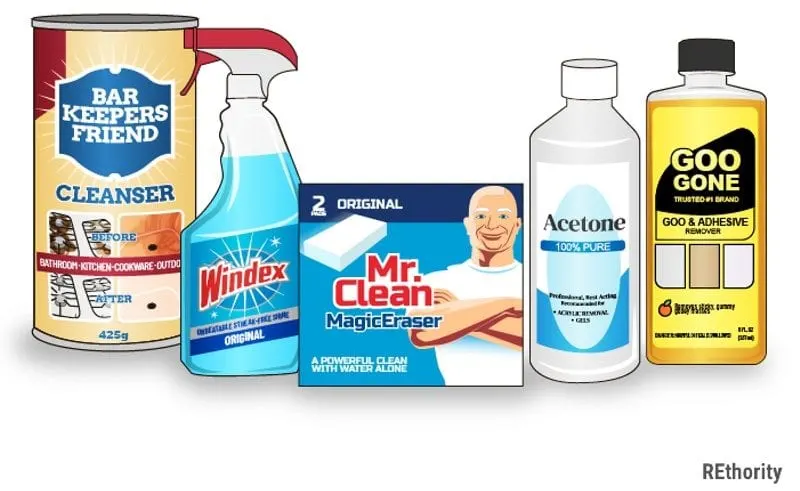
- Specialty cleaning products designed to remove stains from quartz countertops are always a safe bet, but they’re more expensive than other options. Consider keeping a bottle on hand to use when you notice a new stain.
- Bar Keeper’s Friend and Bon Ami work to remove quartz countertop stains, but they should be used carefully because they are abrasive cleaners that can scratch the surface. Use it directly on the stain with a soft brush to try and remove the stain. Do not scrub vigorously. If the stain doesn’t appear to be disappearing, stop using it and rinse the spot with warm water.
- Windex or other glass cleaners can work to remove some mild surface stains on quartz countertops. Spray a little on the stain, let it sit for a minute, then wipe it off with a soft cloth.
- Mr. Clean’s Magic Erasers can remove a stain from quartz countertops. Be careful and rub the eraser on the stain gently, looking for any surface dulling (magic erasers contain an abrasive that can damage the countertops with too much use). Stop using if you notice the surface of your countertops changing appearance.
- Acetone (found in most nail polish removers) can remove ink and sticky stains from quartz countertops, but it must be used cautiously. Only apply it directly to the stain and wipe it away immediately. Rinse the spot with warm water to remove any residue immediately.
- Goo Gone or Goof Off (adhesive removers) can remove gummy or sticky stains on quartz countertops. Apply it directly to the stain and let it sit for a few minutes, no longer than 10. Wipe it off, then rinse with warm water to remove all residue.
Note: Keep in mind that these are common recommendations, but you should check with your quartz countertop manufacturer for advice on cleaning stains. Some materials and cleaners may damage the appearance or finish of your countertops.
What Damages Quartz Countertops?
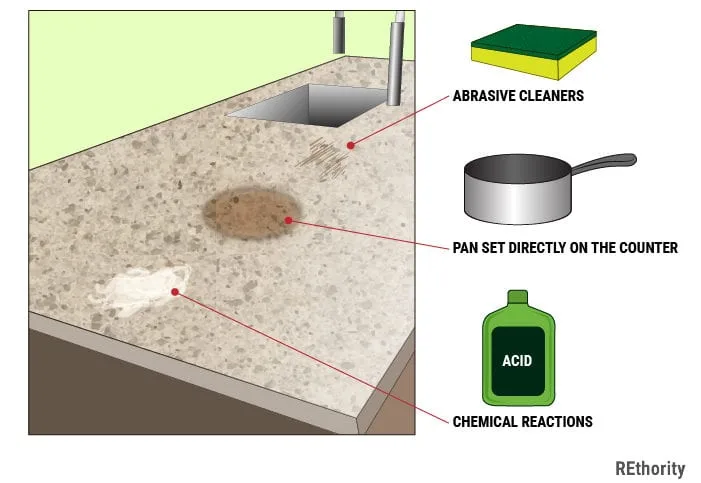
It’s important to know not only what is safe to use, but you should also know what not to use on quartz countertops.
Here are the substances that will damage or mar the finish of quartz countertops.
- Highly acidic or alkaline cleaners (oven cleaner, turpentine, drain cleaners, bleach, etc.)
- Abrasive cleaners (like Comet and Ajax)
- Direct heat above 300 degrees Fahrenheit
- Fast, drastic changes in temperature
- Blunt force or pressure from dropped pots and pans
- Cuts and scratches from knives and blades
- Chemical reactions with liquids or substances directly on the countertop
Any of these can damage your quartz countertop and mar the finish or appearance. Remember, because quartz countertops aren’t porous, most stains and problems appear as a bleached-out or lighter spot on the countertop.
If none of the stain removal methods work to remove it, you may need to have the countertop repolished to remove the stain completely.
Quartz Countertop Maintenance Tips
You can maximize your quartz countertops’ lifespan and appearance by putting a few “rules” in place for how your counters are used.
In general, it’s best to treat quartz countertops like sealed wood to keep them in good condition.
- Always use a trivet or hot pad to protect the countertops from anything hot—pans, crockpots, electric skillets, etc.
- Always use a cutting board when cutting or chopping foods on your countertop.
- Always check with the countertop manufacturer before using a new cleaner or polish on your quartz countertops.
- Never use bleach on quartz countertops, even if they’re white.
- Never seal quartz countertops. It will dull the shine over time, and quartz countertops are naturally nonporous naturally.
- Never leave a strong cleaner sitting on quartz countertops for longer than the recommended time.
- Never leave liquids sitting on quartz countertops. This will result in hard water stains that are very difficult—sometimes impossible—to remove.
How to Clean Quartz Countertops: Summary
We’ve covered a lot of information here, so let’s recap. Quartz countertops are nonporous and resistant to stains, but chemical reactions with the resin contained in the countertops can occur and result in stains or a bleached-out appearance.
Regular Countertop Cleaning
Cleaning quartz counters regularly with mild dish soap and warm water will stop most stains from setting in and keep your counters gleaming. Make sure to dry the countertops afterward with a dry, soft cloth.
To disinfect, use a mix of 1/4 cup rubbing alcohol in 2 cups of water to spray quartz countertops. Let the mixture sit for up to 3 minutes, then wipe off and rinse with warm water before drying the countertops.
A putty knife carefully pushed level with the countertop can remove solid debris from quartz countertops. Do not angle the putty knife.
Removing Stubborn Stains
Stubborn stains may be removed using several cleaning products, but take special care when using any type of abrasive chemical or product. It’s best to avoid bleach, turpentine, and other highly acidic or alkaline cleaners entirely.
Intense heat and rapid temperature changes will damage quartz countertops, so always use a trivet or hot pad to insulate the counters from such changes. A cutting board is necessary to keep the surface from getting scratched.
Keep in Mind
Overall, quartz countertops are easy to clean, but more difficult to remove stains from. If you tend to put your countertops through a lot of abuse or aren’t big on regularly maintaining them, quartz countertops aren’t a good choice.
But if you don’t mind regularly wiping the counters down and ensuring the counters are protected from sharp objects, heavy force, and temperature changes, they are a beautiful and affordable option for your kitchen and bathrooms.

